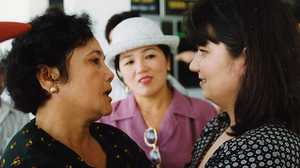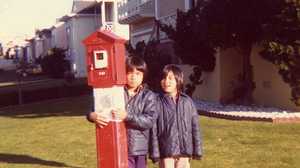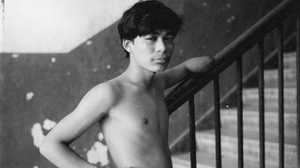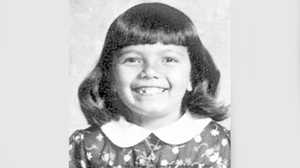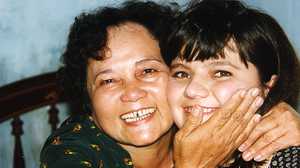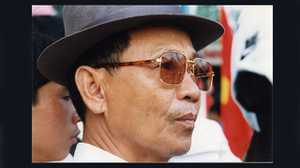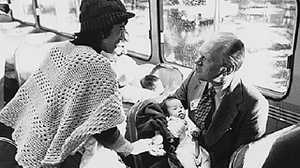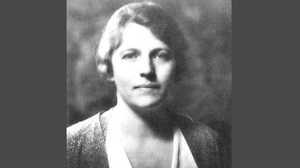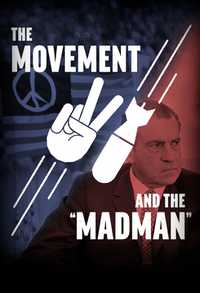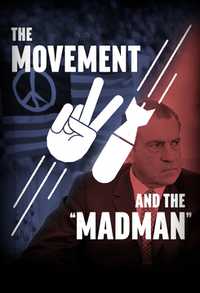KIM: There were so many rumors. I was so frightened. If I didn't send my child away both she and I would die.
HEIDI: And I remember this for as long as I live. It was just so vivid. We were standing there holding hands. They literally had to pry us apart to get me on that plane. How could she do this to me? How could you just give up a child like that?
DANANG, VIETNAM
KIM: I've been in pain for twenty years over my daughter. Finding her would be like giving birth a second time, like finding a needle at the bottom of the sea.
HEIDI: I've always wanted to know about my birth mom. I still had memories, but as the years went, the picture of her face in my mind was fading. That's why I had to find her and get ready to go over there... meeting her face to face for the first time in twenty-two years.
We're going home! I hear those planes and so many memories... so many memories. I was born in Danang in '68.
KIM: When I gave birth to her, she had no father, so I gave her my last name. And I named her Hiep because it means united... united with her mother.
HEIDI: I remember hearing the gunfire and every once in a while, y'know, we'd be playing outside and somebody would rush us inside real quick, and we knew, you know.
KIM: I heard the Viet Cong were attacking nearby and they would arrive here any day. It was March, 1975. What I heard really worried me. If you had worked for Americans and had racially mixed children, they said those kids would be gathered up -- they would be soaked in gasoline and burnt.
On March 15th I dressed her up and got her stuff ready. I took her to the orphanage but couldn't bear to go inside.
AMERICAN SOCIAL WORKER: I'll take care of him. I'll give him a good home.
KIM: It was like losing a piece of myself. I raised her brother and two sisters, but I had to let her go.
HEIDI: When I left, I was confused more than anything. I didn't understand what was going on and why my mother wasn't coming with me. But then I thought, well, it must have been me. I must have been a bad child, y'know, for her to give me up and not want me.
KIM: After taking her there, I told her to remember...one day you will come look for me, you must never forget.
VOICE OF PRESIDENT FORD: I have directed that money from a $2 million special foreign aid children's fund be made available to fly 2,000 South Vietnamese orphans to the United States as soon as possible.
TOM MILLER, ATTORNEY: We didn't know this at the time, but as a last desperate attempt of the White House to gain sympathy for the war, and possibly additional funding for the war, they backed what was called the "Orphan Airlift."
TRAN TUONG NHU, JOURNALIST/TOM'S WIFE: And they asked for Vietnamese to come to the presidio, because they, they were bringing over lots of little children. So I went to the presidio, and was one of the few Vietnamese living in the bay area at the time. I remember going into a room and there were some kids who were about 7 and 10 years old. I remember saying to them: "You don't understand what's going on now, but this is very important. You have to remember who you are."
TOM MILLER: Her friends who volunteered to assist, one of them called her and said, "You know, these children, many of them are not orphans -- they're talking about their families."
And we immediately notified the adoption agencies and the U.S. government that many of the children did not appear to be orphans, and they didn't respond. There was zero response.
There was an adoption industry in Vietnam where people would be able to adopt cute Vietnamese children of course there were true orphans -- there was no question about that. But often these adoption homes were places where children were placed by their families who couldn't take care of them. What this whole business was doing was creating a situation where families were being induced to give up their children.
VOLUNTEER SOCIAL WORKER, US ADOPTION AGENCY: If you can help me, if you know people who are poor, who cannot take care of their children, if they are mixed children, I would like to help them. I am not taking them away from you. I'll send them to good families. Tell them. Because I can take the children and send them to America. And it's better for everyone.
VIETNAMESE WOMAN (Unidentified, speaking broken English): He tell me go with you.
SOCIAL WORKER: Let him go with me, aww, can I take him? Can I take him to the United States?
VIETNAMESE WOMAN: No.
SOCIAL WORKER: Aww... you think. You think about it, because he saw me take other boy. Other boy very happy.
VIETNAMESE WOMAN: Yes. Very happy.
KIM: I asked her, if she didn't give me any papers, how could I find my child in the future? She said when the Americans came back, I would have my child again.
TOM MILLER: The government never had a complete list of the children. They were literally dumping them on the plane. You might recall that one of the planes crashed, and about a hundred children were killed.
KIM: I got a letter saying there was a plane crash. They said my child died.I said it's impossible.
WOMAN SPEAKING AT AIRPORT (ARCHIVAL FOOTAGE): I saw her, she's gorgeous, she's coming down, come on...
HEIDI: From the time I left Vietnam and I came over here, it all runs together to me. It's all a blur.
REPORTER AT AIRPORT (ARCHIVAL FOOTAGE): He looks a little perplexed now.
MAN HOLDING CHILD (ARCHIVAL FOOTAGE): I think so...well, first of all, he doesn't speak the language so he's not quite sure what everybody is doing here.
HEIDI: I remember meeting my adopted mom. They put us in this little white room, y'know kind of like the rooms you go in when you go to the pet store and you go and see the pets. That's what it felt like to me. And I remember her talking to me, and of course I didn't understand a word she said. I used to ask her for my mother. And I would cry and cry and cry.
MABEL NEVILLE/HEIDI'S GRANDMOTHER: Here we are. This is the first day we went there. This is Heidi with the baby doll. That's Heidi's adopted mother Anne.
DON NEVILLE/HEIDI'S UNCLE: The way I found out about Anne was adopting Heidi, I think, was talking to my mom. She told me over the telephone. I says: "What in the world is she doing that for?" And I was very perturbed. I says: "Y'know, with all of the kids in this country that need homes -- why?" And she says: "Because the government in its infinite wisdom has thrown up so many barricades to a single mom adopting a kid."
HEIDI: I remember going to her house, not knowing what was going on, and why am I here with this lady? I remember watching her one time doing laundry, and she put it in this machine, and I thought wow y'know, so I noticed one day she said the cat was dirty. And you will not believe what I did. I put that cat in the washing machine, and all of a sudden you here this "meooww" and this thing thumping against the machine like that. My mom comes running into the room. She says: "cat! Cat!" And I pointed to the machine, and she pulled that cat out, and that cat was just so pitiful looking.
DON NEVILLE: The first time we met Heidi she was just a little dark-haired urchin -- just cute as a button. And couldn't speak any English, and of course you know how much Vietnamese I could speak.
BABYLIFT ENGLISH CLASS, 1975
TEACHER: Good morning!
CLASS: Good morning!
TEACHER: How are you today?
CLASS: Fine, thank you. And you?
TEACHER: Now, Bin, you say "Good morning Quai," and Quai says "Good morning, Bin, how are you today?"
BIN: Good morning, Quai.
QUAI: How are you today?"
BIN: I am fine, thank you. And you?
QUAI: I am fine.
HEIDI: I remember going to a private school to learn English. And then we moved to Tennessee and that's where I spent the rest of my years.
ROYCE HUGHES HUGHES/GIRL SCOUT LEADER: Heidi was very shy at first, and I remember that she spent an extra year in kindergarten because she "no speaka' da' English good." She had to learn.
WANDA HAMLET/SECOND GRADE TEACHER: We had black and white children that had been going to school together for many years. But at the same time, we had black children and we had white children, and we had not had ever had one like Heidi before.
HEIDI: My adopted mom, she did everything she could to make me American as possible.
BRENDA LEWIS / FAMILY FRIEND: She was strictly all-American. She loved bologna. I don't know if you want me to get started about that.
ROYCE HUGHES: We made a southerner, a southerner out of her real quick as far as that goes, mm'hmm.
GIRL SCOUTS (ARCHIVAL FOOTAGE): On my honor, I will try to serve God and my country.
BRENDA LEWIS: Heidi's features and her complexion and everything is just like an American that's had a suntan. When she was growing up, and even until now, I still look at her as a white American. Because there's really not much oriental in her.
JOHN BUB / HEIDI'S HUSBAND: She really looked oriental then and really, she was short, long, straight black, real black, hair. Then when we got to high school, I didn't recognize her because she had a perm. She permed her hair all the time back then.
HEIDI: See, nobody knew.
BRENDA LEWIS: One good thing about Pulaski -- the blacks and whites get along great. Of course they go to school together... they're allowed to eat together... so it's a little community that's bind together.
JOHN: The racism -- they keep it hidden. It is, I mean, it is the place where the KKK originated.
Every year they march on the anniversary. You know, downtown and all that.
HEIDI: I think a majority were against the KKK. But there were also people we knew that were part of the group. It's like you know you find out your teacher is, or your...
JOHN: The sheriff....
HEIDI: The sheriff, yeah. It takes you by surprise.
JOHN: She told me not to tell anyone that she was half-Vietnamese. And at the time I understood, being in Pulaski.
HEIDI: My adopted mom, I'm not sure how she felt about me being Vietnamese. But she would always tell me I am not supposed to talk about this; this is not something you tell anybody. If anybody asks you where you were born, you tell 'em Columbia, South Carolina.
KIM: I never forgot Hiep for even a moment. The more miserable my life was, the more I missed her. My head went crazy in those days, like a mad woman. I was determined to find Hiep at any cost. I'd beg every westerner to help me get to the U.S.
TRAN TUONG NHU, JOURNALIST: I had a friend who was interviewing people who wanted to come to America in the orderly departure program, and he met a woman from Danang, whose name was Mai Thi Kim. She wrote him a letter, and she explained in that letter that she had had this daughter and that at the age of 7 she had sent her away. But it was just by coincidence... that she, there were plenty of other interviewers, but he was my friend. He was able to send the letter to me. So I sent a letter to the old adoption agency.
HEIDI: I was probably 21, 22, when I started looking for her. Y'know, writing letters and calling people, looking on the internet. It was through the internet that I found the Holt Agency, and they said "Yes, we have a file on you. In fact, we have a letter from your birth mom." I was like, there's no way this lady could be my mom. And then when I finally got the pictures in the mail, I was like, yes, this is true, y'know, and I looked at her. I even went to the bathroom. I held her picture up to the mirror so I could see if there was a resemblance. And I was like, yes, this is definitely her.
TRAN TUONG NHU: I get a message on my machine. A person with a very deep southern accent calling me up. I don't know if I should even imitate this southern accent, but it really killed me. She said "Ms. Nhu, my name is Heidi Bub, and I have reason to believe you know who my mother is."
ROYCE HUGHES: When I heard that Heidi was going to Vietnam, like I said, I was just really, really surprised. I just, I wished her well and everything else, and hoped that she would find what she was looking for. But yet at the same time I just really didn't know what to expect of what she would find.
HEIDI: It's unbelievable. I, I would never have dreamed in a million years that I would be doing this. It's like I still have to pinch myself.
TRAN TUONG NHU: This for me was also the fulfillment of some dream that I had had. Hoping, that even if it didn't work for a lot of people, it would work at least for one person. That they would be able to be reunited with their, their mothers. To be reunited with Vietnam. Just for the sake of some sort of justice. Some poetic ending. There are many, many words for mother, but I believe she calls herself "meh."
HEIDI: Meh
TRAN TUONG NHU: Mah. It goes downs...Meh. Or she might called herself "mah." You're going to be crying so hard you...
HEIDI: I won't be able to say anything anyway. I'll just be going "maaaahh."
TRAN TUONG NHU: I don't know if you're going to remember this, because you want to say I love you, right?
HEIDI: OK
TRAN TUONG NHU: "Gong" is "I".
HEIDI: "Gong"
TRAN TUONG NHU: Thuong...t-h-u-o-n-g....
HEIDI: I just hope they understand I have been a hundred and one percent Americanized. And I have no earthly idea of their expectations.
HANOI, VIETNAM
HEIDI HAS A LAYOVER BEFORE FLYING TO DANANG.
HEIDI: They just cook on the street? I don't know?
I worry that I'm going to hurt somebody's feelings. Or insult them. If I do something, I just hope they overlook it and think "Oh, she's, she's American -- she doesn't know any better."
I fear most of seeing her husband. I know he tells her that he accepts me as her own, but there's got to be that little bit of resentment, maybe because he's not my father.
This morning I got up at 6 and tried on like ten different outfits, trying to figure out what to wear, trying...I'm real nervous, I mean, nervous as can be. I've done my makeup. I put on a waterproof mascara that John bought me because he knew I would need it. Other than that I'm just trying to calm my nerves.
I'm just... this flight is just going a bit too fast for me. It's only an hour flight, but it's going to feel like a minute. Y'all are going to have to carry me off the plane, I just know it. They're gonna' have to push me.
KIM: At night I lay in bed and dreamt I was talking to her. I told her my dream had come true. That I was no longer hopeless and disappointed, and that I would never lose her again.
HEIDI: It's gonna' be so healing for both of us to see each other. It's gonna' make all of those bad memories go away. And all of those last years not matter anymore.
I can't do th. ... Here's the moment!
KIM: Your brother and sister here. Your sister Hien.
SISTER: Dad, where's dad?
(Lower Third ID) DO HUU VINH, FATHER OF HEIDI'S SIBLINGS
HEIDI: Nice to meet you.
KIM: Father Tinh and Hien. I love you 22 years already. I don't give you away. I very love you! Maybe you will take me go with you.
HEIDI: I will.
KIM: You will, OK? I'm very happy. I'm very happy. Very, very, very happy. Everybody say me stupid, crazy.
KIM: So much pain. I've been looking for you all these years. I've suffered so much. Don't think I just abandoned you.
We go my house, okay?
HEIDI: Your house is over here?
KIM: I say you're beautiful. 22 year already.
HEIDI: That's right.
KIM: Everybody say "look like me."
KIM (HEIDI REPEATS IN VIETNAMESE): I... love... you daughter... very... much.
I... love... you mother... very... much.
KIM: Your brother. Your sister. And miss Hiep.
HEIDI: And I saw a picture of my brother, and that's when I really connected with him again. It was just, like, instant connection there. And I just stared and stared at his picture, and remembering how he used to hold me and play with me all the time. It was amazing that I could remember all that stuff. I mean, I feel like it's been suppressed for so long and all of this is just making it come back so much.
TINH: While my mother worked, I played her role at home.
DO TRONG TINH, HEIDI'S BROTHER
TINH: I cared for my sisters and I was also going to school. Among my sisters, Hiep was the only little one.
DO THI THU HIEN, HEIDI'S SISTER: In the past when Hiep was small I used to bathe her. When I bathe my daughter I think of little Hiep.
SISTER, NIECE AND NEPHEW, SINGING: Dad loves me cause I look like mom. Mom loves me cause I look like dad. Our family loves each other. When we're away we're sad. But when we're together, we always laugh.
HEIDI: Jessica...Kaitlin. She looks like you.
KIM: I'm their grandmother. This is me at work. Yeah, look like you already.
HEIDI: I've always wanted the feeling that someone would love me no matter what. And I never had that with Anne.
MABEL: This is Anne, my daughter. And that's Heidi.
HEIDI: She was a single parent. She did everything. Y'know I had everything growing up. I just didn't have a very loving parent.
We went on these trips that people in Pulaski just don't do, they would just think: "Wow, they're the luckiest people. They have it all." But you know, they don't know the inside story.
MABEL NEVILLE, HEIDI'S GRANDMOTHER: This is Anne and Heidi.
BRENDA LEWIS: She was really way down deep, maybe a lonely child. I really don't want to say a whole lot about that. Heidi really probably needs to tell you more I mean about some of the things Anne did.
HEIDI: She hardly told me she loved me. I can only remember one time....Never hugged or anything, she was just not that type of person.
MABEL NEVILLE: I trained 'em up right. I never had a problem out of 'em. Had a son, lived this near 'ch'pel hill, never had a problem out of 'm...No kind of problems.
DON NEVILLE: Basically mother was the disciplinarian. And she was a hitter. You know, a screamer and a hitter. And so that's basically how I grew up. Y'know, "ahh -- don't hit me again,"...type of thing.
I certainly would hope Anne didn't raise Heidi like we were raised, because that would not be an environment... in fact, probably you'd go to jail today.
HEIDI: I used to ask my friends if they got spankings, or stuff like that. And spanking to them was maybe a pat on the bottom, y'know, not with a belt or whatever the closest thing she could reach was.
I mean, I don't want to y'know portray her as a child batterer or anything, y'know I just...I don't think of it that way, y'know. I...I feel like she had no control over what she was doing.
When I hit the dating age is when her anger really grew because my time with her became less and less. You know, I was going to be all of hers or none at all. And that's the way she wanted it.
That's how we had our breakup. It was the summer after my sophomore year in college. I'll never forget this -- I mean it was like y'know one of those traumatic moments that you -- that's just etched in your mind.
I had a date that night...I went out on my date and I came home...I was ten minutes later from my date. And she had put a sign on the door saying, y'know, "this house closes at 11." And she had dead-bolted the door and I couldn't get in. So I had to spend the night at one of my girlfriend's house that night. And she told me you know that she felt like that I owed her for the life that she had given me....All the trips we had been on, y'know. Everything through the years. And she told me I could either live under her roof and go by her rules, or I could just leave.
And I was like: "What do you mean leave?" And she was like: "y'know, leave. You don't live here anymore."
I've tried contacting her over the years after that. She tells people you know as far as she's concerned, she doesn't have a daughter anymore.
That's when I went through a lot of depression because I felt, oh gosh, I've lost two mothers you know. The first one gave me up, and this one doesn't want me. I said I must be a horrible person. I always thought it would be totally different if I was really her blood daughter.
HEIDI, SPEAKING TO KIM): I searched for a present to give to you from my heart. So I gave you a heart ring to remember me.
KIM: Oh, thank you very much.
HEIDI: It fits...beautiful.
KIM: My heart and your heart...
HEIDI: We're connected.
KIM: OK!
HEIDI: I used to ask myself how could I love this person that I don't even know? I mean, how? It wasn't until that phone call, and hearing her say "I love you daughter," it was like, how could I have ever doubted that I would love her?
It's matching, you both have the same watch.
(SCENE CHANGE: HEIDI CONTINUES): This is my first big Vietnamese meal. The food, y'know. You just reach off the plate?
TRAN TUONG NHU: Reach off the plate...you want to eat this, and eat that.
HEIDI: You don't serve yourself on the plate first?
TRAN TUONG NHU: Take a little bit. You can dip it in this.
HEIDI: What is that, soy sauce?
KIM: Fish sauce.
HEIDI: It's hot!
KIM: See you tomorrow.
HEIDI: I spent the night in my room, and my mother of course, spent the night with me. She hasn't left me since I've been here. I slept until she woke me up this morning, you know, she said: "You awake?" And I said: "I am now," you know... and it was 6:15!
So this is where we used to live? When I was little.
I grew up not having a bunch of affection, or touching, and here it's like, all my relatives have to touch me.
So people remember me, huh?
KIM: You were born here so everybody remembers you.
HEIDI: So people remember me? They're just so proud, y'know, and they don't know what else to do but just show me off. I'm only gonna' be here 7 days.
FAMILY SHRINE
HEIDI: It's still hard for me to fathom how close they are. I mean, the ties that everybody has. The extended family, the aunts, the uncles, the nephews and nieces. They may not have much here, but they do have that family love and unity. And I'm, y'know, I'm kind of jealous of that.
TRAN TUONG NHU: And sometimes you slept with your grandmother. And then when you got to America, you had to sleep alone.
HEIDI: Yeah, I cried, I cried.
TINH (Heidi's brother): Now that you're grown up you have a husband to sleep with.
HEIDI: ....Embarrass me!
(SCENE CHANGE: HEIDI CONTINUES): If you told me back in high school that I would marry a military man, I would have said: "you're crazy." And then finding out my father was in the military was like, wow, so ironic. So I never really knew who my father was. He was one of the American soldiers there.
KIM: Her father was generous and loving. He brought food for her brothers and sisters. I did it for my children, for food and clothes. Because my husband Vinh left without saying a word. It was February, 1964. My husband said he was leaving to join the army. But he didn't actually join it. He joined the communists instead.
VINH: Back then, I thought the duty of a young man was to defend the country when there's a war, even it is requires a sacrifice.
KIM: The police arrested me. They said they knew me husband was a communist. I said: "then why don't you arrest him instead of me? I've been looking for him everywhere. Bring him back, I'll reward you if you find him."
A friend got me a job at an American base. I thought if I worked there, people would think I sympathized with the Americans. Up until then, I'd never seen Americans. When I was near them I'd get scared. My boss knew I was scared, so he approached me slowly. He called the interpreter over to tell me that if I loved him, he would take care of me and all my children. He left four months after I got pregnant.
TINH: I was miserable when Hiep was born. At school, my friends teased me about my mother. But it was for our living. If my mother hadn't been with an American, she'd have had to be with someone else. I wasn't angry at my mother, but I was sad about the way things had to be.
KIM: In those days, people condemned women who consorted with Americans. They considered them whores, excuse my language. When they looked down on me that way, I felt I was worthless.
TINH: Back then, our family was like a boat heading toward a waterfall. We had no control, and could just be swept away. When I went to the beach, the other kids looked so happy to have both parents. I longed for that.
APRIL 10, 1975
TINH: I was happy when my father came home after so long. I was glad to be reunited with my father, but I didn't have much feelings for him anymore.
VINH: When our nation was liberated, my duty was over. I returned to provide comfort for my wife and children to heal the wounds of the war.
SCENE CHANGE: VINH CONTINUES: Today is the 22nd anniversary of the day the war ended. The Vietnamese nation won independence and freedom. We saved the country from the Americans.
HEIDI: The way I felt about the war when I was learning about it in school -- I kind of kept it to myself. Inside, I just felt, just wanted to scrunch down in my chair and hide.
I don't remember a thing, but I know it means a lot to my father because he was directly involved in it. For me, it's just a parade.
VINH: When I came back, my wife had already sent Hiep away. If she hadn't, I would have raised her as my own child. We fought against adults. She was only a child.
HEIDI: I could not imagine my life here, as opposed to living in the states. I could not imagine it at all.
I look at this woman, and it's like, look at all that she has done for me. And where I am now, and I wouldn't be where I am, and have the life that I have, if she hadn't made that choice 22 years ago to give me up.
I went to college, and went through school and had a great education. She was telling me my own sisters didn't even make it through the sixth grade.
HIEN: I'm the poorest child in the family. I don't have material things, but I still help my parents. If they're sick, I was their clothes and cook for them.
HEIDI: At my sister's Hien's house, their shower consists of having a bucket of water and pouring it on you. I don't know now if I could survive here, after having the luxuries that I do.
KIM: Hiep went away, and this daughter stayed behind. So now this daughter leads a miserable life. Please ask Hiep to help her sister out.
HIEN (WITH HEIDI REPEATING IN VIETNAMESE): I... love... you sister... Hien.
I... love... you sister... Hiep... a lot.
HEIDI: I gave my sister Hien who is having a rough time right now some money to help her out, and she didn't even blink twice. She asked me for more. She said: "You continue to help me, so kids can go to school and maybe I can find a job." I was rather insulted by that. I just felt like that was just kind of rude.
TRAN TUONG NHU: That's your benefactor. The person who's overseas is the person who's going to save the family. And any family that's lucky enough to have that lifeline will prosper. It's the common knowledge in Vietnam.
Having been through all this war and desperation, the Vietnamese are very up-front -- especially about money.
HEIDI: I don't want them to put me on the pedestal, and say: "This is the one who's going to save us." Because I didn't come here to be anybody's salvation. I came here to be reunited.
SCENE CHANGE: HEIDI CONTINUES): Very bad, no. You've had one already! Okay, you drink beer -- but no smoke! Deal? Okay, put it out. I'm broke.
SCENE CHANGE: HEIDI CONTINUES): Before I got here and actually face to face with my mother, I always had this image of a soft-spoken, kind, loving, caring person. I mean I see that in her, but I also see that she's very aggressive.
KIM: Very, very happy.
HEIDI: The bond that I was hoping to have with her was acceptance of the little girl that she let go. And when I got here it was like I was the parent, and the parent was the child. She wants to be with me 24 hours a day, and I'm feeling a little smothered.
KIM: My daughter's still young and na•ve. I just want to be close so we can confide in each other.
HEIDI: I just want to step back and say "whoa -- this is not what I had pictured." I was like, ugghh, I've had these two hours and now it's back to touchy-touchy-feel-feel. It makes it even worse that we're all hot and sticky -- uh. Like the day we went to the market to get the food for the feast.
It was so hot in there, and the food was out and the fish smell, and it was just not the best circumstance to be in.
I was just trying to push her along, saying: "c'mon, c'mon, c'com, what else do you need? Is this it? Are we finished?" She wanted to take her time, and she wanted to stop and talk to everybody. I would say: "Oh please, don't draw any more attention to us. Please just keep walking and get what you need and get out of here."
KIM: I love you.
HEIDI: ...love you. Ready?
KIM: Mushroom, onion, carrots...
HEIDI: Pineapple...All of it?
KIM: I'll help you.
HEIDI: Since we've been here, it's definitely put me in a different world. I feel like I'm on another planet. I've never been away this far from my own family -- my husband and my two little girls, and I'm feeling homesick. It's setting in really hard.
I know this may sound so selfish of me, but I just cannot wait to get out of here. I wanna' go home and escape this world and go back to the one I know, and it's comfortable to me, and that's sane almost. Sometimes I wish I could turn back the clock and not know any of this.
TRAN TUONG NHU: The eve of our departure to Vietnam, Heidi gave me a little soaring star and it was engraved "Thank you for making my dreams come true." And in a way her dream came true, and it was much much more than she had bargained for.
With Heidi, there was no way of really telling her what she was going to come up against. And I don't know if it was my job to tell her all of this, I mean I was trying desperately to teach her to say hello to her mother. I tried to warn her about how things were different in Vietnam. She gave me this: "I have to leave. I have to get out of here. I'm gonna' go back with you." I was going to go home a little early. I tried to comfort her, and I said to her: "listen, if you stay, after a few days things will become much less pressurized for you."
DING DUNG/TRANSLATOR AFTER NHU LEAVES: I haven't seen you in twenty two years, and now you're here, and I am very happy now.
KIM: I'm too old and poor to buy presents for your family, but your siblings have done so on my behalf.
PHOUC: The time you've been here has been so short. There's been no time for intimate talks. We don't know who you are yet. Maybe next time you can stay longer, so we can have deeper conversations.
HEIDI: Yeah. Okay.
TINH: This time you don't speak any Vietnamese, and we can't speak English. We can't communicate with each other properly, or understand each other emotionally. I'm sorry for that.
For 22 years, we've had no news of you, so we, your siblings, have taken care of our mother.
Now we hope you'll assume the filial responsibility a child has toward parent. Perhaps you could bring her to live near you to renew the love between mother and child.
HEIDI: He wants me to bring her to the U.S. to live me with me? And then send her back?
DUNG: It's a suggestion -- to make up for lost time.
HEIDI: Tell them that it's impossible to make up for all that lost time, and I don't want to make it up. I just want to live for now and the future. Not for the past.
TINH: Okay, then, let's live in the present. And while we're waiting for her to go to the States, maybe Hiep could, with the consent of her family, help support our mother with a monthly stipend. Feel free to say yes or no.
DUNG: When you go back to United States, you can talk with John, and if you cannot bring mother to the united states, then you can provide her with some money monthly to have her... I have been frank with you, and so I would like you to be frank with me.
TINH: We have a present from us and Lien's family. You want to give it now?
SPEAKERS OFF CAMERA: Just give her the gifts now? We don't want to force her. This is too... awkward. She's too emotional. She's just come back for a visit. This is how things are done in Vietnam.
HEIDI: I can't do this.
PHOUC: It's all too uncomfortable for her. She can't say no, but she also can't... This is her first visit to Vietnam. Let's go slowly.
HEIDI: I can't do this. I am so mad. I can't do this. I'm so mad.
TINH: What's wrong? I was just asking her to help her family.
PHOUC: Go out and console her.
HEIDI: Take me away from here.
VINH: She sure cries easily, doesn't she?
KIM: Have some compassion.
VINH: Tell her to come back now.
TINH: I tried to talk to her but she didn't listen.
HEIDI: I can't do this anymore.
TINH: It's been 22 years, my child, and now you've come back to visit your home, the place of your ancestors, where your umbilical cord was cut and placenta buried. On the anniversary of your departure, we treasure your return. Although materially we're poor, our love for each other is rich.
PHOUC: Don't worry, little sister. We're right here, we'll take care of the family. Please come back inside and join the family.
KIM: As your brother just said, don't give too much weight to what just happened. If you can take care of me, go ahead. If you can't, that's fine too. Seeing you is what matters. I don't want you to be miserable. All I want is for you to be happy with our family. I know you'd never abandon me, or else why would you have come back? If you'd lived in Vietnam all your life and refused to take care of me, then I'd be angry that you behaved like this. Since you've lived abroad for so long, your reaction is different.
Life is different there. I understand, and I don't blame you. We've got lots of time. Today, tomorrow, this year, forever. It's not as if you're going your way and I'm going mine. It's forever.
PHOUC: We're trying to understand your situation, and we hope you'll try to understand ours. Let's just be happy. Yes, let's just be happy. Don't try to force anything.
KIM: We don't speak the same language, so it's not clear. What she doesn't know about the Vietnamese notion of love and emotion? She's used to living a different way. She doesn't understand, it's not good to force her. She's still in shock. I'm afraid when she goes back, she might be angry. It's hard. Poor thing, she sees me and thinks I'm asking for money. And all I know is how much I love her. This is just a misunderstanding.
HEIDI: I don't know what to do! I just don't know anymore! I just don't know. I wish this didn't happen. I wish I could have just kept the memories I had -- they were so happy. I wish this trip never happened now, because I'm gonna' leave with all these bad memories and all this bad feelings, and it's not how I wanted it to be.
SCENE CHANGE: HEIDI CONTINUES: It breaks my heart to know your condition, and that I can't help you as I want to. Your expectations of me are more than I can handle, and I wasn't prepared for it. I wish I could fulfill all your needs, but I will do what I can, and I hope that you will...I just hope that it will be enough.
SCENE CHANGE: HEIDI CONTINUES: My mother gave me this picture of her and she said my father when he was here, he used to keep that picture in his room. I don't have much motivation as far as looking for my dad. Part of me really, really would like to know and find him and stuff. But do I want anymore? Do I want to open anymore cans of worms, y'know? I'm not sure I do.
KIM: I kiss you to keep your essence with me. We have only a few minutes left. We'll see each other again one day. Now I give you my address so you'll write a letter to me.
HEIDI: Okay. Okay -- okay--okay. Well, I'm going to the airport, kay? Ciao, family. I love you.
NAVY HOUSING - RHODE ISLAND
HEIDI: You're my girl....no cries, no cries.
I came home, and I just surrounded myself with the kids. I didn't want to do anything but be with them.
Go give him a kiss.
I've only been back three weeks, you know, so...
JOHN: Oh, thank you.
I'd ask her about the trip, and she'd tell me in very general terms, and then she's expect me to understand -- in depth -- how she felt, and be able to discuss things with her, and I'm like: "I asked you questions and you're not telling me anything. I mean I don't know anything, I don't know how you felt while you were there. There's no way I could understand. You're not even trying to make me understand." And that would really just infuriate her. It was just last week that she told me, here it goes again, she says: "why don't you ask me any questions about my trip?" And I'm like: "Heidi, it was a week ago that we just stopped talking about it because we weren't getting anywhere because we weren't getting anywhere 'cause you weren't telling me anything about it -- and I asked you plenty of questions... 'oh! When did you ask me any questions?!"
HEIDI: Oh, stop. (laughter).
TINH: The only thing I regret was that as a Vietnamese, I thought what I said was normal. But for an American, it was a shock. This is very common in Vietnam. In a family, if you're better off... you might help us out. But Hiep couldn't understand that. I'll study English so I can write them a letter, then she'll understand what kind of person her brother is.
KIM: You passed away mother... Hiep is gone...I burn incense to you, mother. I'm in so much pain. I don't know what to do. Please protect Hiep and her children, so they will come back and help build your tomb.
HEIDI: The last day she gave me a self-addressed envelope with her address on it, and it just sits on the table. And, y'know, I look at it but I just look at it and walk by and say I can't. I wouldn't know what to say.
TWO YEARS LATER
HEIDI: That's still to me a fuzzy dream that happened. This is what I know, and this is what I grew up with.
MABEL NEVILLE: I'm glad you went over there, and I'm glad you made a lot of pictures too.
HEIDI: But you're who I know.
MABEL: Yeah, as well as anybody should I guess.
HEIDI: Yeah, yeah. Grandma -- how long've you had this corn in here?
The few contacts I've had with them -- every letter they wrote was a plea for money. I felt like I couldn't do this anymore. It was just too hard for me emotionally. And now it's -- I hardly hear from them, and of course they don't hear from me at all.
MABEL: And let's find your mommy. Where is she?
KAITLIN: Right here. That's my mommy.
MABEL: It sure is. And she's laughing out loud. Hear her? Can't you hear her laughing?
KAITLIN: Yeah. I can hear.
MABEL: (grandma laughs) Yeah, she can hear her laughing!
Alright, let's find another one.
Your momma' said they were working in the rice fields. You know what rice is? You eat rice?
KAITLIN: I like rice.
MABEL: You do?
JESSICA: I don't like rice.
MABEL: You like me and she's like her mother. But I like rice now, so I guess I like rice if it's cooked real good.
HEIDI: Looking back, I just feel really bad the way I handled it. But I don't know them. They're strangers to me. I guess I have closed the door on them. But I didn't lock the door. It's closed, but it's not locked.

